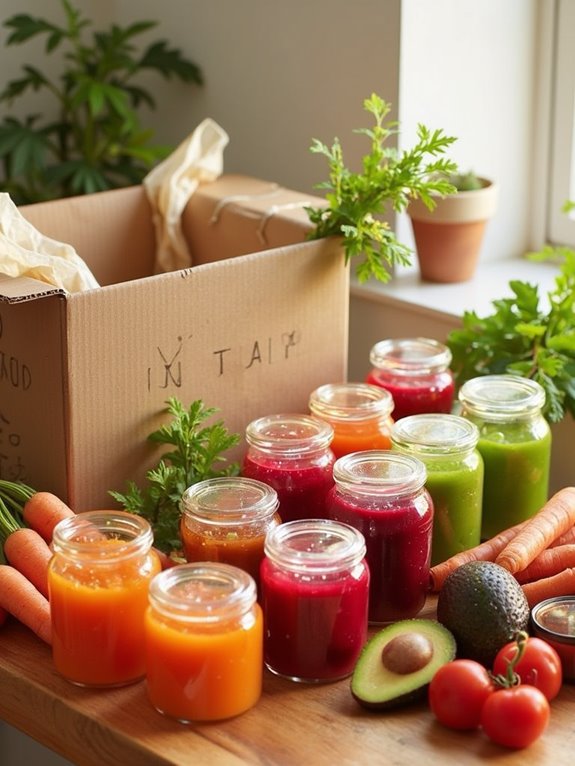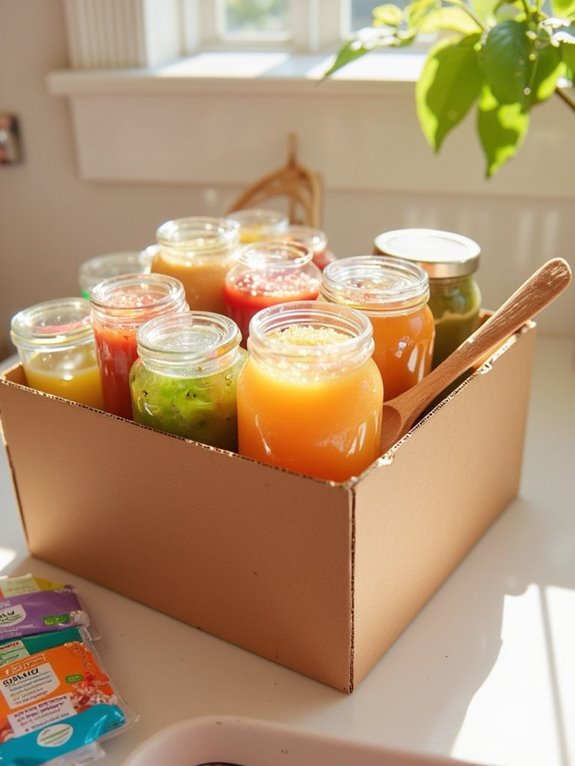As an Amazon Associate, we earn from qualifying purchases. Some links may be affiliate links at no extra cost to you. Although our opinions are based on curated research, we haven't used these products. Articles generated with AI.

5 Best Organic Baby Food Delivery Services, According to Parents
Leading organic baby food delivery services include Gerber’s Stage 1 smooth purees, Serenity Kids’ eco-friendly pouches, Earth’s Best glass jar variety packs, and Happy Baby’s transparent stage-appropriate options. You’ll find USDA-certified organic ingredients, clear developmental guidelines, and convenient packaging across these trusted brands. While Gerber and Earth’s Best offer traditional jars, Serenity Kids and Happy Baby focus on portable pouches. Each service provides different texture progressions, from single-ingredient purees to more complex blends, with detailed nutritional information to guide your choices.
Key Takeaways
- Gerber offers USDA-certified organic purees in glass jars with stage-appropriate options from 4 months onwards, focusing on single ingredients.
- Earth’s Best provides organic fruit purees in recyclable glass jars and variety packs suitable for different developmental stages.
- Happy Baby delivers transparent pouches with USDA organic ingredients in stage-appropriate textures for babies 6-9 months old.
- Serenity Kids features Clean Label Project certified veggie purees in BPA-free pouches with extensive contaminant testing.
- All services offer flexible delivery options with clear stage labeling, supporting gradual texture progression as babies develop.
Gerber Stage 1 Organic Butternut Squash Baby Food (10-Pack)
Sale
Gerber Stage 1 Baby Food, Organic Butternut Squash Jar, Baby Puree, Non-GMO, Vegetable, Puree Jars...
- CONVENIENT BABY FOOD: Our Gerber Organic Butternut Squash Baby Food Jar is designed for ease and convenience. These jars of baby food are made in a portable and...
- NUTRITIOUS: This organic baby puree has 15% of the daily value of vitamin A and 30% of the daily value of potassium
- STAGE ONE: This is a stage 1 baby food jar. It has been designed for babies who are able to sit with help or support and are ready to start solids, making it a great...
For parents beginning their baby’s solid food journey, Gerber’s Stage 1 Organic Butternut Squash offers a trusted first step into healthy eating habits. You’ll find these non-GMO verified purees come in convenient glass jars, perfect for on-the-go feeding, while delivering 15% of daily vitamin A and 30% of daily potassium your little one needs.
When you’re ready to introduce solids, this smooth-textured puree works well for babies who can sit with support. You can even mix it with other foods for added versatility. The consistent quality and organic ingredients mean you’re giving your baby pure, wholesome nutrition without artificial additives or GMOs.
Best For: Parents introducing solid foods to babies who can sit with support and are looking for an organic, nutrient-rich first food option.
Pros:
- Non-GMO verified and organic ingredients ensure pure, wholesome nutrition
- Convenient glass jar packaging makes it perfect for storage and on-the-go feeding
- Rich in essential nutrients with 15% daily vitamin A and 30% daily potassium
Cons:
- Some reports of occasional mislabeling of product contents
- Limited flavor variety compared to other baby food options
- Glass jars may be heavier and more breakable than plastic alternatives
Serenity Kids Organic Baby Food Pouches Veggie Puree (8 Count)
Serenity Kids 6+ Months Veggie Puree Baby Food Pouches - USDA Organic Baby Food - BPA-Free...
- Serenity Veggie Power: Dive into snack time with Serenity Kids veggie pouches. Packed with organic goodness, these baby essentials have no added sugar, letting your...
- Nutrient-Packed Purees: Fuel your tiny tot's growth with these organic baby food pouches. Rich in protein and healthy fats, they're a smart choice for introducing pureed...
- Organic Adventure Awaits: Let your baby embark on a veggie-filled journey with our organic baby food stage 1 pouches. USDA Organic ingredients mean clean nutrition for...
Parents seeking organic, nutrient-dense baby food will find Serenity Kids’ 8-count variety pack of veggie purees an excellent choice, especially when convenience matters most. Each BPA-free pouch contains 3.5 ounces of carefully selected organic vegetables, including squashes, roots, and sweet potatoes, with no added sugars or artificial ingredients.
You’ll appreciate that these pouches have earned Clean Label Project’s Purity Award, undergoing testing for over 400 contaminants. When you’re finished, you can recycle the pouches through TerraCycle’s program by freezing, packing, and shipping them with a pre-paid label. While they’re pricier than conventional options, you’re investing in rigorously tested, nutrient-rich food that mirrors breast milk’s macronutrient profile.
Best For: Health-conscious parents seeking organic, nutritionally balanced baby food who value convenience and are willing to pay more for rigorously tested, clean-label products.
Pros:
- Clean Label Project Purity Award certified with testing for 400+ contaminants
- Convenient, BPA-free pouches perfect for on-the-go feeding
- Nutritionally balanced with organic vegetables and no added sugars
Cons:
- Higher price point compared to conventional baby food options
- Some pouches may have inconsistent texture or oiliness
- Requires extra effort to participate in TerraCycle recycling program
Earth’s Best Organic Baby Food Jars Stage 1 Variety Pack (12 Pack)
Earth's Best Organic Baby Food Jars, Stage 1 Fruit Puree for Babies 4 Months and Older, Organic...
- ORGANIC FRUIT PUREE: Made with wholesome ingredients like organic fruit puree, these baby food jars help nourish your little one as they explore new foods and textures
- RESEALABLE GLASS BABY FOOD JARS: Resealable glass jars make it easy to store leftovers or portion out meals and can even be washed and re-used as baby food storage...
- STAGE 1 BABY FOOD: Expand your little one's pallet to stage 1 foods and introduce them to the exciting new flavor combinations of our fruit puree jars
Looking to introduce organic fruits to your baby’s diet? Earth’s Best Stage 1 Variety Pack offers twelve 4-oz glass jars filled with USDA-certified organic fruit purees, perfect for babies 4 months and older. You’ll get four jars each of pear, apple, and banana purees that help develop your little one’s palate.
These resealable glass jars make storage simple, while the single-fruit purees provide a clean start to your baby’s solid food journey. Parents love the convenience, quality ingredients, and reasonable pricing, plus the jars are reusable and eco-friendly. When you’re ready to expand your baby’s menu, Earth’s Best offers stage 2 options featuring vegetables, broths, and proteins.
Best For: Parents seeking organic, single-ingredient fruit purees to introduce solid foods to babies 4 months and older who want convenient, high-quality baby food options.
Pros:
- USDA-certified organic ingredients with no artificial additives or preservatives
- Convenient resealable glass jars that are reusable and environmentally friendly
- Variety pack includes three different fruit flavors to help develop baby’s palate
Cons:
- Glass jars may be heavier and more breakable than plastic alternatives
- Limited to just fruit purees, requiring separate purchase for vegetable varieties
- Higher price point compared to non-organic baby food options
Earth’s Best Organic Baby Teething Snacks, Strawberry Banana
Earth's Best Organic Baby Food, Dissolvable Teething Snack for Babies 6 Months and Older, Strawberry...
- ORGANIC TEETHING SNACK: These organic crunchy sticks dissolve easily and help soothe your baby's gums as they teethe
- WHOLESOME INGREDIENTS: Made with simple ingredients, like organic banana powder and organic strawberry powder, for finger food that's fun and flavorful
- STAGE 2 BABY FOOD: Introduce your baby 6 months or older to these dissolvable teething snacks and promote busy gums, playful learning, and teething relief
Certified organic ingredients make Earth’s Best Teething Snacks, Strawberry Banana flavor, an excellent choice for health-conscious families committed to clean eating. You’ll appreciate the convenient five-pack design of individually wrapped .56 oz portions, perfect for diaper bags and on-the-go snacking. These dissolvable crunchy sticks, suitable for babies 6 months and older, provide safe teething relief while encouraging self-feeding skills.
The mild, sweet flavor combination appeals to developing taste buds, and the texture dissolves easily, minimizing choking concerns. While they’re slightly pricier than conventional options and don’t pack significant protein or fiber, you’ll find these USDA-certified organic snacks deliver reliable quality and peace of mind for occasional teething relief.
Best For: Health-conscious parents seeking organic teething snacks for babies 6 months and older who prioritize natural ingredients and safe self-feeding options.
Pros:
- USDA-certified organic ingredients with no artificial additives or preservatives
- Convenient individually wrapped portions perfect for on-the-go use
- Dissolves easily in mouth, reducing choking hazards while soothing teething discomfort
Cons:
- Higher price point compared to non-organic alternatives
- Limited nutritional value with low protein and fiber content
- Small portion sizes may require frequent purchases for regular use
Happy Baby Organics Stage 2 Baby Food Pouches (16 Pack, 4 oz)
Happy Baby Organics Stage 2 Baby Food Pouches, Gluten Free, Vegan & Healthy Snack, Clearly Crafted...
- Clearly Crafted: When it comes to caring for your baby, transparency is everything. Thats why we bring you Clearly Crafted. Our clear packaging lets you see the...
- Stage Two Eaters: Great for the exploratory taste buds of Stage 2 eaters, our Stage 2 baby foods and baby snacks introduce baby to simple balances of fruits and veggies...
- Happy Baby: We provide organic, delicious options for your babys nutritional journey; Happy Baby offers baby food pouches, cereals, teething wafers, baby snacks and more...
These versatile Stage 2 baby food pouches serve as an ideal solution for health-conscious families seeking trusted, organic nutrition for their little ones. You’ll find USDA organic ingredients clearly visible through transparent packaging, letting you see exactly what you’re feeding your baby.
Each pouch delivers smooth purees made from real fruits and vegetables, perfect for developing palates and busy lifestyles. You’ll appreciate the convenient, grab-and-go format, whether you’re introducing new flavors to your baby or accommodating a picky toddler. With non-GMO ingredients grown without toxic pesticides, these pouches offer peace of mind while supporting your child’s nutritional journey through balanced, stage-appropriate portions.
Best For: Parents and caregivers seeking convenient, organic baby food options for Stage 2 eaters (6+ months) who want transparent ingredients and easy-to-serve portions.
Pros:
- USDA organic, non-GMO ingredients with clear visibility through transparent packaging
- Convenient grab-and-go format perfect for busy families and travel
- Smooth purees ideal for introducing babies to new flavors and textures
Cons:
- Higher price point compared to non-organic baby food options
- Single-use packaging creates more waste than homemade alternatives
- Limited shelf life once opened and must be refrigerated
Factors to Consider When Choosing Organic Baby Food Delivery

When you’re selecting an organic baby food delivery service, you’ll want to carefully evaluate key factors like ingredient quality, storage requirements, and age-appropriate food stages that match your little one’s developmental needs. You should consider practical aspects such as packaging options, which can range from glass jars to squeeze pouches, and how they’ll fit into your family’s lifestyle and storage space. The delivery schedule‘s flexibility is also vital, as you’ll need a service that can accommodate your household’s unique routine while ensuring you’ve got fresh, nutritious options readily available for your growing baby.
Ingredient Quality and Purity
Parents seeking organic baby food delivery must prioritize ingredient quality and purity as their foremost consideration, since what goes into their little one’s body directly impacts growth and development.
When you’re evaluating organic baby food delivery services, you’ll want to verify several key quality markers. Look for products that carry legitimate organic certification from recognized organizations, along with non-GMO verification labels. You should carefully review ingredient lists, ensuring they contain whole foods without artificial additives or preservatives. The best services will provide detailed information about their testing protocols, especially for contaminants like heavy metals and pesticides. Additionally, you’ll benefit from choosing companies that maintain transparency about their sourcing practices, making it easy for you to trace ingredients back to their origins and verify their quality standards.
Storage and Shelf Life
Understanding how to properly store organic baby food deliveries can make the difference between preserving essential nutrients and wasting precious meals. When you receive your delivery, check expiration dates immediately and store unopened containers in a cool, dry pantry away from direct sunlight.
For maximum freshness and safety, you’ll want to follow these storage guidelines:
- Keep unopened jars and pouches at room temperature until ready to use
- Once opened, transfer leftover portions to airtight containers
- Refrigerate opened food and use within 24-48 hours
- Monitor shelf life differences between glass jars (several months) and pouches (shorter duration)
- Write opening dates on containers to track freshness
Age-Appropriate Food Stages
Three distinct stages of organic baby food align with your little one’s developmental milestones, making it crucial to match delivery options with your baby’s age and abilities. When you’re selecting a delivery service, look for companies that clearly label their stages:
- Stage 1 (4-6 months): Smooth, single-ingredient purees perfect for first-time eaters
- Stage 2 (6-9 months): Thicker textures with combined ingredients and more complex flavors
- Stage 3 (9-12+ months): Chunky textures and multi-ingredient blends that encourage chewing
You’ll want to guarantee your chosen service offers appropriate options for your baby’s current stage, with the flexibility to adjust as they grow. Many delivery services allow you to customize orders based on your baby’s age, making it easier to transition between stages while maintaining proper nutrition and texture progression.
Packaging Type Options
When choosing organic baby food delivery services, you’ll need to carefully weigh the various packaging options available, as each type offers distinct advantages for storage, convenience, and environmental impact.
Glass jars remain a trusted choice, offering excellent preservation of flavors and nutrients while being fully reusable. You’ll find they’re ideal for at-home feeding, though their weight makes them less practical for travel. Pouches, meanwhile, provide ultimate convenience with their lightweight design and mess-free feeding system, perfect for on-the-go parents. If environmental impact is your priority, look for services that offer recyclable plastic containers or pouches with take-back programs. These options balance durability with sustainability, and many brands now provide detailed recycling instructions or dedicated recycling programs to ensure proper disposal of their packaging.
Delivery Schedule Flexibility
Beyond selecting the right packaging, delivery schedule flexibility stands as a key factor in making organic baby food delivery work for your family’s unique routine. You’ll want to look for services that offer customizable delivery windows and the ability to adjust your schedule as your baby’s needs evolve.
Consider these key scheduling features when choosing a service:
- Option to pause or reschedule deliveries when plans change
- Same-day or next-day delivery availability for urgent needs
- Recurring delivery schedules that you can modify
- Clear communication about delivery timing
- Flexible delivery windows that align with your daily routine
With reliable timing and adaptable scheduling options, you’ll ensure consistent access to fresh organic baby food while minimizing waste and maintaining ideal nutritional value for your little one.
Nutritional Value Assessment
Making informed decisions about your baby’s nutrition requires careful evaluation of the nutritional content in organic baby food delivery services.
When analyzing your options, you’ll want to examine the vitamin and mineral content, ensuring it matches your little one’s age-specific nutritional needs. Look for services that prioritize whole ingredients, like pure fruits and vegetables, while avoiding added sugars and artificial preservatives. You can verify quality through trusted certifications, such as USDA Organic and Non-GMO Project Verified labels.
Pay attention to portion sizes and recommended serving frequencies, as these factors directly impact your baby’s nutritional balance. Consider services that offer detailed nutritional information and ingredient transparency, allowing you to track important nutrients like iron, calcium, and essential fatty acids that support healthy development.
Price Per Serving
Understanding how to calculate the true cost of organic baby food delivery can save you considerable money while ensuring your little one receives quality nutrition. When evaluating subscription services, you’ll want to look beyond the package price and determine the actual cost per serving.
Start by dividing the total subscription cost by the number of servings provided. For multi-pack options, you’ll often find better value compared to individual containers. Don’t forget to factor in the serving sizes, as they can vary considerably between brands. For instance, if you’re comparing two services, one might offer 4-ounce portions while another provides 6-ounce servings.
To maximize value, consider your baby’s feeding schedule and portion needs. Many delivery services offer bulk discounts or subscription savings that can reduce your cost per serving over time.
Brand Safety Certifications
While cost considerations help narrow down your options, the safety certifications carried by organic baby food delivery services provide critical assurance about product quality. When selecting a service, you’ll want to look for trusted certifications like USDA Organic, Non-GMO Project Verified, and Clean Label Project Purity Award.
These certifications mean the brand undergoes regular testing for harmful substances like heavy metals, pesticides, and industrial toxins. You’ll find that certified companies maintain transparent sourcing practices and face routine audits to ensure they’re meeting strict safety standards. When you choose a delivery service with recognized certifications, you’re getting peace of mind that your baby’s food meets rigorous quality benchmarks. It’s worth taking time to verify these credentials, as they directly impact your little one’s health and wellbeing.
Frequently Asked Questions
How Long Can Opened Organic Baby Food Be Safely Stored?
You’ll need to store opened organic baby food properly to maintain safety. Once opened, refrigerate purées immediately and use them within 24-48 hours. For homemade organic baby food, you can safely store it in airtight containers for 48 hours in the fridge or up to 3 months in the freezer. If you’ve heated the food, discard any leftovers after the feeding, as bacteria can grow quickly in partially consumed portions.
Are Organic Baby Food Subscriptions Worth the Extra Cost?
While organic baby food subscriptions may seem pricey upfront, you’ll likely find them worthwhile if you value convenience and quality ingredients. You’re paying for pre-portioned, fresh meals delivered to your door, saving precious time on shopping and prep. The cost typically averages $4-6 per meal, which is comparable to making organic food at home when you factor in ingredients, waste, and time spent. Consider starting with a trial subscription to test if it fits your needs.
What Age Should Babies Start Eating Organic Solid Foods?
You can start introducing organic solid foods to your baby around 6 months of age, when they show signs of readiness like sitting upright, controlling head movements, and losing the tongue-thrust reflex. While some pediatricians suggest starting between 4-6 months, waiting until 6 months guarantees your baby’s digestive system is mature enough. Start with single-ingredient organic purees like sweet potatoes, avocados, or bananas, and watch for allergic reactions.
Can Organic Baby Food Pouches Be Warmed Before Serving?
You can warm organic baby food pouches, but you’ll need to do it safely. The best method is to place the sealed pouch in a bowl of warm water for 1-2 minutes, making sure not to use boiling water. Don’t microwave pouches, as this can create dangerous hot spots and degrade nutrients. Always test the temperature on your wrist before serving, and once warmed, use the pouch contents within one hour.
Do Organic Baby Foods Contain Any Preservatives or Additives?
Most certified organic baby foods don’t contain artificial preservatives or synthetic additives, as they’re regulated by strict USDA organic standards. You’ll find that these products rely on natural preservation methods, like using lemon juice or citric acid. However, you should always check the ingredient list, as organic products can contain natural preservatives and additives like ascorbic acid (vitamin C), which helps maintain freshness and nutritional value.









